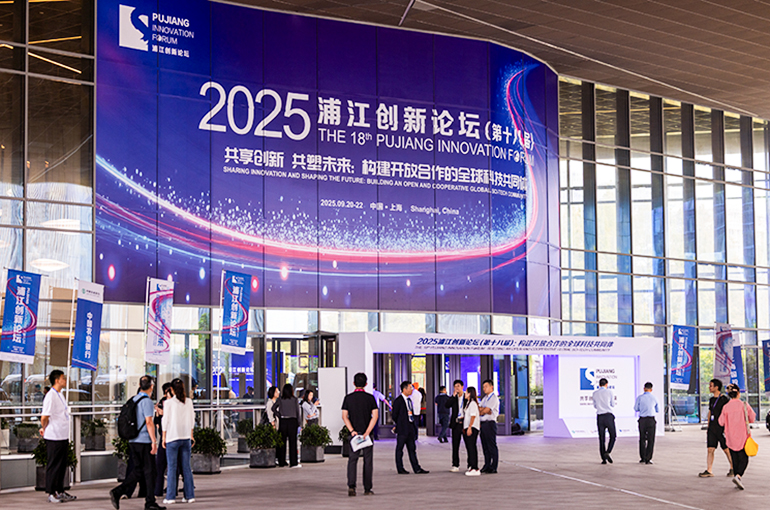 18th Pujiang Innovation Forum Opens in Shanghai
18th Pujiang Innovation Forum Opens in Shanghai(Yicai) Sept. 22 -- The 18th Pujiang Innovation Forum, themed ‘Sharing Innovation and Shaping the Future, Building an Open and Cooperative Global Sci-Tech Community,’ officially kicked off in Shanghai on Sept. 20.
Around 550 guests and 300 organizations from 45 countries and regions participated in the main forum and various sideline events, with nearly 40 percent coming from Belarus, Denmark, Germany, Switzerland, and the United States.
This year’s Pujiang Innovation Forum is more focused on cutting-edge fields, emphasizing the creation of a global platform for scientific and technological innovation.
Face-to-face interaction between people is irreplaceable, said Benoit Dubuis, president of the Swiss Academy of Engineering Sciences and director of the Sino-Swiss Institute of Advanced Technology at Shanghai University.
Shanghai has established a solid foundation for innovation and plays a connecting role globally through platforms such as the Pujiang Innovation Forum, Dubuis added.
Upgrade of InnoMatch and WeStart
The InnoMatch Tech-Matching Fair and the WeStart Entrepreneurial Investment Conference, two major matchmaking events at the Pujiang Innovation Forum, were among the most popular events at the forum.
WeStart attracted 1,487 teams from four cutting-edge fields -- biomedicine, integrated circuits, artificial intelligence, and future industries -- to register for the WeStart Top 100 Innovation Competition. Among them, 71 were from overseas teams.
Moreover, WeStart gathered over 100 domestic and international venture capital institutions, major banks, insurance companies, and other financial institutions to facilitate investment and financing matchmaking activities.
The Shanghai Future-Oriented Industries Fund, which was established at last year’s Pujiang Innovation Forum, launched a brand-new community for frontier technology entrepreneurs at WeStart this year.
This new community aims to discover the Chinese entrepreneurs for the next decade and create an ecosystem for them, allowing disruptive innovation to emerge naturally, said Wei Fanjie, general manager of the Shanghai Future-oriented Industries Fund.
Moreover, the WeStart Early-Stage and Small-Scale Investment Alliance was also established, with the Shanghai Technology Innovation Center, Shanghai State-owned Capital Investment, Shenzhen Capital Group, and CAS Star as members.
The alliance aims to gather resources through a larger platform, attract early-stage projects from around the world, and better provide researchers with the funding and resources they need, said Huang Lihong, director of the STIC.
InnoMatch released 10,000 technology demands to the global community, with enterprises investing over CNY20 billion (USD2.8 billion). It also unveiled 2,000 job openings and debuted more than 80 cutting-edge products and experience scenarios across frontier industries.
For the first time, six proof-of-concept platforms dedicated to future industries were presented collectively at InnoMatch.
InnoMatch has been successfully held five times, releasing more than 21,000 technology demands and over 35,000 nationwide job openings for scientific and technological innovation talent. It has showcased 4,080 innovative products and high-quality achievements.
A total of 3,113 enterprises have released investment demands exceeding CNY100 billion (USD14 billion) at the five InnoMatch events held so far, with nearly CNY18 billion (USD2.5 billion) in intended cooperation agreements reached.
Targeting Frontier and Future Industries
The 2025 International Forum on Mesoscopic Brain Mapping was also held at the Pujiang Innovation Forum. At this sub-forum, the International Primate Mesoscopic Brain Mapping Alliance was established, marking the official launch of the Whole-Brain Mesoscopic Neural Connectivity Atlas, a major science initiative.
The establishment of the alliance marks the beginning of systematic global collaboration in primate brain mapping research.
Moreover, a forum focusing on artificial intelligence quantum and quantum intelligence was also held at the Pudong Innovation Forum. The Shanghai Quantum AI Consortium and the Shanghai Quantum Technology Equipment Industry Innovation Alliance were officially established there.
Moreover, the top 10 application scenarios for quantum computing in Shanghai were released, further strengthening the strategic development and commitment to the cutting-edge field of quantum AI.
Zhang Jie, member of the Chinese Academy of Sciences and director of the Tsung-Dao Lee Institute at Shanghai Jiao Tong University, said at the Pujiang Innovation Forum that his team plans to build the first commercial fusion power plant in Shanghai through a three-step approach, aiming to achieve key technological breakthroughs around 2030 and reach commercial operation by 2045.
Luo Delong, deputy director of the International Thermonuclear Experimental Reactor, said that China has entered the leading ranks in the field of nuclear fusion. He emphasized the importance of applying what is learned through international cooperation while continuously enhancing the country’s own innovation capabilities.
Editor: Futura Costaglione